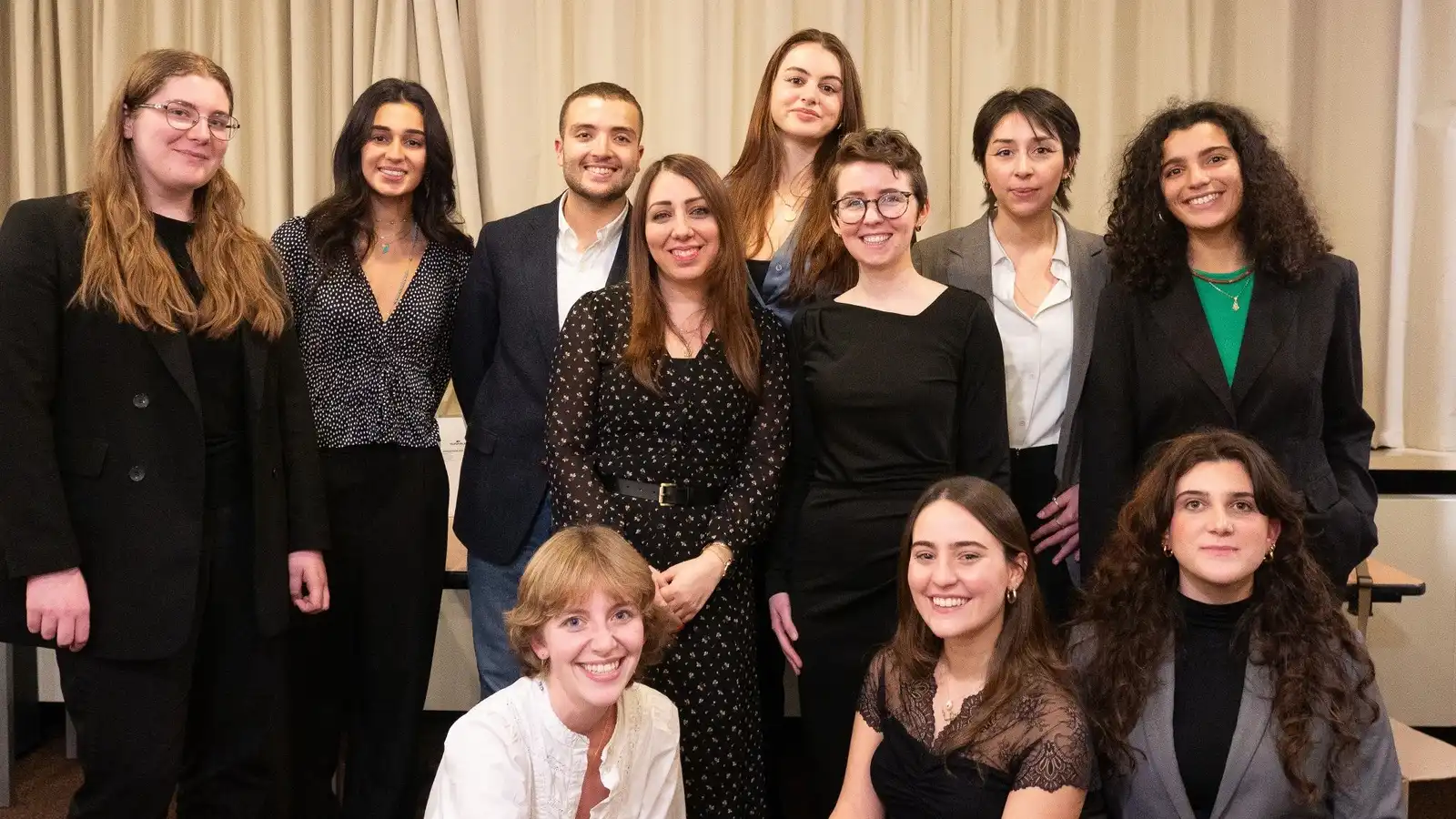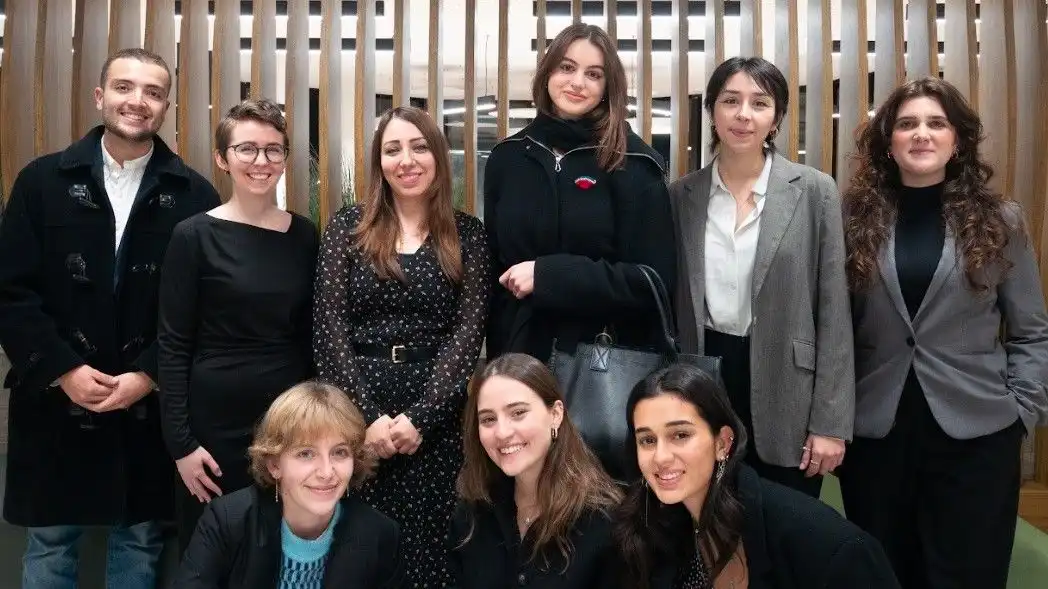Home>Voices of Change: Women’s Political and Social Roles in the Middle East – Perspectives on Women Participation in Constitution-Making
11.03.2025
Voices of Change: Women’s Political and Social Roles in the Middle East – Perspectives on Women Participation in Constitution-Making
Reflections on the Student-led Conference at Sciences Po Law School: “Voices of Change: Women’s Political and Social Roles in the Middle East – Perspectives on Women Participation in Constitution-Making.”
An interview with the student organizers, Tatiana Van den Haute, Andréa Baldovi, Dana Fidawy, Romane Bompard, and Clémence Roy.
Tell us about the motivation behind organizing this conference?
This student-led conference at Sciences Po Paris Law School, which took place on December 3rd 2024, aimed to demonstrate the role of students as active contributors to academic discourse, able to initiate and drive discussions on underexplored perspectives within constitutional and legal studies. Inspired by Prof. Alsarghali’s course on “Women’s Participation in Constitution-Making: Case Studies from the Middle East,” this academic initiative was a voluntary, non-evaluative event to share our passion for these topics with our peers and take the lead in organizing.
Can you elaborate on the choice behind naming the conference “Voices of Change”?
The title captures what we felt and learned during Prof. Alsarghali’s course, which challenged oversimplified portrayals of the Arab world and centered the voices and experiences of women whose contributions to constitution-making processes are often neglected or framed as passive in mainstream academic discourses. The course specifically focused on women’s roles in constitutional drafting processes following the Arab uprisings of 2011, with case studies from Tunisia, Egypt, Lebanon, Syria, and Palestine.
Additionally, our title refers to the voices of remarkable women whom we had the honor to welcome and learn from in our class: the first female judge in the Christian Lutheran Courts and the Deputy Head of the Supreme Court in Palestine, as well as a member of the Syrian Constitutional Committee from the opposition prior to the fall of the Al-Assad regime. In addition, we had the pleasure of welcoming in person the only female judge on the Constitutional Council of Lebanon. Their experiences and perspectives on women’s roles in governance and constitution-making provided depth, nuance and authenticity to the lived realities of being a woman in the MENA region, far from the portrayals we often receive.
The title “Voices of Change” was also intended to reflect the diversity and complexity of women’s aspirations for rights, their ability and willingness to engage in the sphere of governance, and the means they have or create to do so. Women’s experiences are shaped by intersecting social, economic, and political factors, cultural and religious influences and constraints. In this context, it was important for us to highlight the impact of Personal Status Laws, which affect women’s rights in the private and public spheres, and shape their views on gender equality and governance.
Finally, we selected Sliman Mansour’s painting Mother and Daughter (1983) as the conference’s visual centerpiece. The figure of the woman is a recurring motif in Mansour’s work: her green eyes symbolize the vitality of the grass, her tall height reflects pride and independence, and her hands convey the dignity of a working woman. She embodies strength and power, elements which do not undermine her femininity but rather, enrich it. These qualities are symbolic of the women whose voices and stories we sought to amplify throughout the conference.
Tell us about the format of your conference?
We aimed for our initiative to reflect the professionalism of an academic conference, both in the quality of its content and in its organization. We were fortunate to present in the Sciences Po’s Salle du Conseil, an ideal setting that allowed us to engage with guests from the Sciences Po faculty, administration, and students from different Masters programs. We were also honored to receive Sharon Hickey, Associate Programme Officer in the Constitution-building Programme at International IDEA.
The conference was structured around an opening session and three main panels. In the opening panel, Dana Fidawy, speaking on behalf of the student organizers, welcomed our speakers and guests, and elaborated on the motivation and process behind our initiative. Following her remarks, Professor Séverine Dusollier, Former Director of Sciences Po Law School Research Centre, emphasized the importance of such academic initiatives and her hope for future researchers among students of this conference.
On her part, Professor Alsarghali expressed her pride with students’ deep engagement with constitutional studies and particularly, constitution-making in the Arab world. She recognized that students’ dedication to organizing the conference reflected their commitment to upholding the Law School’s support and showcased their remarkable attention to detail and high level of professionalism throughout the event. Professor Alsarghali underscored the significance of global conversations in such a setting, enabling students from diverse countries and backgrounds to engage in meaningful exchanges with women from the Arab world who share their experiences, successes, and setbacks, while also allowing them to recognize the universal challenges women face, regardless of their origins.
The conference featured three main panels, each tackling critical issues surrounding women’s roles in constitution-making. The first panel, “Do Arab Women Need ‘Saving’ in Constitution-Making Processes?” challenged Western narratives that often portray Arab women as passive figures in their country’s transformations, highlighting instead their active roles and agency in shaping constitutional frameworks. The second panel, “Setting the Framework for Achieving Gender Equality: Tools and Best Practices in Constitution-Writing,” focused on practical tools and strategies for promoting gender equality in constitutional drafting, examining substantive provisions like quotas and gender-specific clauses, as well as the structural frameworks necessary to support these measures. It also addressed the cultural appropriateness and adaptability of international instruments like CEDAW in the MENA region. The third panel, “Women’s Role in the Constitution’s Cultural and Social Authenticity,” explored the complex negotiations involved in incorporating women’s rights within constitutional frameworks, discussing the balance between international human rights standards and local cultural values, and addressing tensions between feminist and Islamist perspectives, including the potential of Feminist Islamism as a bridge between these viewpoints.
Three distinguished scholars attended our conference as discussants, namely, Professor Tamara El Khoury, Professor Helena Alviar and Professor Nathalie Bernard-Maugiron. They provided critical analysis and comments on the students’ work, and connected it to broader academic and practical contexts. We wanted our conference to follow this format to demonstrate the added value of a collaborative approach, where students and professors engage as partners, working together to dissect complex issues and create new perspectives on important academic topics.
Finally, Sharon Hickey offered closing comments on the significance of this student-led conference, recognizing students’ dedication and engagement with the difficult topics they chose to discuss. This conference provided a platform to center women’s voices in a way that echoes International IDEA’s annual Women Constitution-Makers’ Dialogue, a platform for women involved in constitution-building processes to share lessons, ideas, and resources related to both process design, substance of a constitutional text, and implementation issues.
Which skills did the conference help you develop?
Organizing this conference was an invaluable experience in academic professionalism and project management. Students took the lead in logistical planning, coordinating with speakers, structuring the agenda, and ensuring the event’s seamless execution. These responsibilities required teamwork, time management, and problem-solving, allowing us to develop essential skills while balancing academic work and practical tasks. The process strengthened our ability to manage complex projects collaboratively and under pressure, skills that will undoubtedly serve us in future endeavors.
Would we organize a similar conference again?
Absolutely. This initiative helped demonstrate the importance of student agency in creating and leading such events, in particular for first-year students. We are deeply grateful to Sciences Po Law School— its professors and administration—for their assistance and commitment, especially Professor Alsarghali and Professor Guillaume Tusseau, Director of the Sciences Po Law School Research Centre, whose support was key to the event’s success and the introduction of our course on women in the MENA Region into the Law School’s curriculum. We also thank our distinguished discussants, whose expertise and feedback deepened our understanding of the conference’s complex topics while challenging us in new, thought-provoking ways.
Importantly, we would like to extend our gratitude to International IDEA for their publications, particularly their Constitution Assessment for Women’s Equality which guided our examination of constitutions in the MENA region through the lens of substantive gender equality. The course and conference helped us realize that, as students, we can contribute to the development and refinement of such tools by offering our perspectives on what we have learned and how they can be improved. Sharon Hickey was especially eager to discuss this with us, emphasizing the value of student input. Having access to platforms such as this conference creates larger opportunities for students to engage in the vital work of constitution-building.
Finally, we hope our conference was a powerful demonstration of the importance of a decolonized curriculum. While many of us were already familiar with Edward Said’s Orientalism (1978), this course provided the unique opportunity to experience how our understanding of the MENA region can be transformed by engaging with the authentic voices of women - voices that do not require ‘saving,’ but that must be heard on their own terms. It was essential for us to extend these insights beyond the classroom by opening the floor to diverse audiences, especially students who had not taken the course. We believe conferences are not merely venues for presenting research, but should serve as spaces for dialogue, sharing knowledge, and challenging our existing frameworks of understanding. Ultimately, we hope our event highlighted the need for developing more academic programs and spaces that engage critically with the MENA region as a diverse, dynamic, and complex space that requires nuanced, inclusive, and context-sensitive academic scholarship and dialogue.

